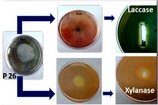Quality Evaluation and Improvement (QEI) Division is engaged in research on fibre extraction, evaluation, quality assurance and grading. Up gradation of quality, evaluation of physiochemical properties of jute and allied fibres are the major contributions of this division including extraction of useful chemicals from agricultural by-products of fibre crops.
Division Mandate
- Conducting basic and strategic research on quality evaluation and improvement of natural fibres and development of instruments for quality assessment
- Identification and characterisation of phyto-chemicals and their plants
Area of work and facilities available
Research carried out in following areas:
1. Fibre extraction and processing 2. Development of grading instruments
3. Fibre quality assessment 4. Bi-product utilization and bio-processing
Facilities:
- Well equipped unique fibre quality testing laboratory having analogue and digital instruments for testing fibre quality parameters
- Chemical Laboratory with Hi-tech equipments for chemical analysis of fibre and natural resources (HPLC, FTIR, AAS, GC, UV- Spectrophotometer, Nitrogen Auto-analyser, Flame Photometer, Portable profile moisture meter, Mobile mapper etc, Jute leaf drier & mixer).
- Production unit of retting accelerator powder for advanced jute retting technology
- Well equipped microbiology laboratory (Gel Electrophoresis, Gel Documentation, Fermenter, High resolution Microscope, Refrigerated centrifuge and Thermocycler/PCR) for identification, screening, characterisation, production and storing of microbial cultures to develop environment friendly jute retting technology
List of on-going Projects under Different Themes:
Theme 1 Automation and Sensor Technology
1.AST/QEI/2021-02 Upgradation of Automatic Jute Grading System


Theme 2 Product development and quality assurance in value chain
- QEI 26 Prospects of bacteria from termite for utilization in retting of jute
- PDQA/QEI/2021-04 Inventory of natural fibre resources and spatial variability of fibre quality of jute, mesta, ramie and flax
- PDQA/QEI/2021-05 Development and refinement of retting technologies for sustenance of framers’ income
- Quality control of natural fibres under AINPJAF (AINPJAF sponsored)

Theme 3 Bioprocessing Technology
6.BPT/MP-24 Study of soil hydro-thermal environment under natural vs synthetic mulch
Theme 4 By-product Utilisation
7.BPU/QEI/2021-09 Exploring Microbial Production of Bacterial Cellulosic Fibre and Its Applications

Theme 5 Application of Nano-technology
8. ANT/QEI 25 Extraction of Quality Keratin from Coarse Wool
Theme 6 Capacity Building and Entrepreneurship Development
9. Jute Leaf Tea and some value-added products (NJB sponsored)
Salient Achievements
Jute mapping and estimation of fibre quality Summary of Achievements
- Best quality jute fibre of North 24 Parganas district was found to be associated with availability of higher quantity of specific macro and micro-nutrients
- Iron content influenced the heaviness/bulk density of the fibre
- Available potassium showed positive correlation with the fibre strength
- Fibre quality varied from TDN3+35!!!%↑to TDN1+10!!!%↑ in North 24 Parganas, TDN4+30!!!%↑to TDN2 in Nadia, TDN3+26!!!%↑ to TDN1 in Murshidabad and TDN3+60!!!%↑ to TDN2 in Jalpaiguri district
- Significant reduction in jute area has been observed in the Murshidabad district using Sentinel satellite data in the year 2019

HoD (Acting) QEI Division: Dr. Biplab Saha, Principal Scientist


















